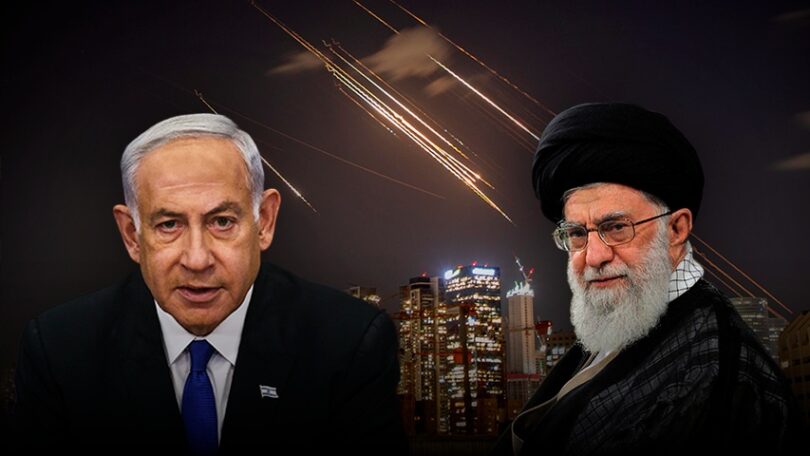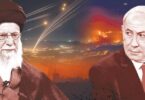By Imran Kamyana
The Pakistan-India conflict in South Asia has not yet fully subsided when, in the Middle East, the flames of war between Iran and Israel have once again flared up. Fundamentally, this is a continuation of Israel’s unchecked aggression in the region, during which Gaza has been ravaged and the genocide of Palestinians continues unabated. Against this backdrop, the ongoing tensions between Iran and Israel have, since last year, intermittently escalated into direct confrontations, including missile and drone attacks on each other.
But this time, the intensity of the conflict is many times greater and its nature far more serious. It began on June 13 with a barrage of Israeli missiles on Iran—marking the largest attack on Iranian soil since the Iran-Iraq war. The assault is still ongoing, and according to Israeli officials, could continue indefinitely. Notably, this strike came precisely at a time when nuclear negotiations between Iran and the United States were underway. Trump had repeatedly suggested that he did not want a new war in the Middle East and preferred resolving matters with Iran through dialogue. However, following the Israeli attack, the continuation of these talks has become virtually impossible—just as Netanyahu would have wished.
But the problem now is not just the scale or intensity of the attack, but the nature of the damage inflicted on Iran. In the early stages of the assault, not only were most of Iran’s top military leadership, including heads of the army and the Revolutionary Guard, killed—alongside key nuclear scientists—but critical nuclear facilities and military infrastructure also suffered severe damage. This is a far greater humiliation for Iran than the July 2024 assassination of Hamas leader Ismail Haniyeh in Tehran at the hands of Israel. It also indicates that Mossad’s network within Iran is far more extensive and effective than previously estimated. Meanwhile, contrary to its outward bravado and bold rhetoric, the Iranian state appears internally hollow and fragile, with its counterintelligence system repeatedly proving ineffective.
This vulnerability stems not only from imperialist sanctions, pressure, and sabotage but also from decades of internal repression, widespread corruption within the clerical elite, and deep internal contradictions. (In fact, it’s even questionable how trustworthy the replacements for the slain military commanders will be.) Fundamentally, this is an ideological crisis of the Iranian state, now manifesting in political and military terms. In such circumstances, the possibility that the Iranian state might collapse under the weight of intense external aggression and pressure cannot be ruled out.
However, Israel’s own situation is far from stable. A prolonged war or state of conflict—largely dependent on Iran’s capacity for resistance—could spark major unrest within Israel itself. Netanyahu and his clique may face a potential popular uprising, and even the imperialist powers, fed up with this gang’s relentless adventurism, could be pushed to take drastic measures.
Following the Israeli attack, it took Iran nearly 18 hours to regain its composure, consolidate its military capabilities, and decide on a response—despite the fact that the Israeli assault had been largely anticipated. Yet Iran had no option other than to retaliate against Israel. This counterattack—or series of counterattacks—was ongoing at the time of writing, with claims that Israeli military bases and airfields have been damaged. Despite Israel’s modern and highly effective air defense systems, several missiles have landed in the capital, Tel Aviv, reportedly causing dozens of injuries and multiple fatalities.
Although Iran’s latest attack may not match Israel’s in terms of effectiveness and destruction, it is nonetheless extraordinary and unprecedented. Moreover, Iran has issued threats to target U.S. and other Western bases in the event of their direct intervention. Thus, the situation remains fluid and rapidly evolving, with the potential to spiral into a large-scale catastrophe.
These fears are already being reflected in rising oil prices in global markets and plunging stock exchanges. Clearly, if the war drags on or expands further, the already crisis-ridden global economy could plunge into a deep recession. A steady stream of condemnations and appeals is coming from major powers. However, the so-called “international community”—including the United Nations, China, and Russia—is, in practice, playing the role of a helpless spectator or, particularly in the case of the major Western powers, actively engaged in apologism for and facilitation of Israel’s actions.
Behind Netanyahu’s unchecked aggression lie several driving forces: his desperate attempts at political survival, the internal crisis of Zionism, and Israel’s rapidly deteriorating global image. But just as importantly, the historic crisis of U.S. imperialism and its increasingly weakening grip over its own puppets also play a critical role. This is once again evident from the vague—and at times contradictory—statements made by U.S. officials following the Israeli attack. This confusion is not merely a matter of American hypocrisy; it reflects a deeper fragmentation and internal confusion within the U.S. state itself, a disarray that has only intensified under Trump’s second term in office.
For several years now, the situation has reached a point where, at every crucial juncture, the U.S. finds itself compelled to follow Israel’s lead and justify its actions—even when unwilling to do so. Trump is, at his core, a narcissistic, ill-mannered, volatile, reckless, and unreliable individual who changes his stance every few hours. He is fond of making loud boasts, but when faced with stronger opposition or serious threats, he quickly backs down. Under such conditions, it’s not hard to imagine the extent to which even his allies and subordinates actually trust him.
But if today the reins of the most powerful economic and military empire in human history are in the hands of such a person, then this is not just an individual failing—it is a reflection of the deep crisis of the entire existing imperialist system. History is replete with examples where declining systems brought incompetent or clownish figures to power, who then only accelerated the collapse of the very system they ruled.
The current devastation in the Middle East has a historical backdrop rooted in centuries of colonial plunder, the carving up of the region, and its division into artificial states—spearheaded primarily by British and French imperialism. The establishment of Israel in 1949 as an outpost of Western imperialism was a continuation of this legacy of domination and exploitation. The unnatural Zionist state has been nurtured as a brutal and ruthless enforcer to maintain foreign imperialist control over this oil-rich region. As long as it exists, the region cannot hope for stability or prosperity.
However, the theocratic state of Iran, born out of a bloody counter-revolution in 1979, holds no progressive credentials either. Granting it political legitimacy or support under the guise of being “anti-imperialist” is a blatant ideological crime. The hands of this sectarian religious regime are also stained with the blood of countless innocents—both within Iran and beyond—including tens of thousands of communists, workers, and women. In the past decade and a half alone, Iran has witnessed at least ten major protest movements, all of which were brutally crushed. Yet the right to determine Iran’s future belongs solely to its people, and only they—through class unity and revolutionary action—can confront and overthrow this oppressive theocratic state while replacing it with something better.
A fundamentalist, grafted, illegitimate, and imperialist thug-state like Israel can never be a liberator of the Iranian people, nor does it have any right to intervene in or launch “pre-emptive strikes” on any country in the region. Strategically, every blow landed on Israel is welcome. However, the present situation also makes it clear that Israel cannot be defeated on religious-ideological or capitalist-economic grounds. This is not merely a military issue, either. This cancer—whose roots also lie deep within the reactionary and subservient Arab regimes—requires revolutionary surgery to be eradicated.
Clearly, this historic task is tied to dismantling imperialist capitalism across the entire region, including Iran—a task that only the working masses of the Middle East can fulfill.






